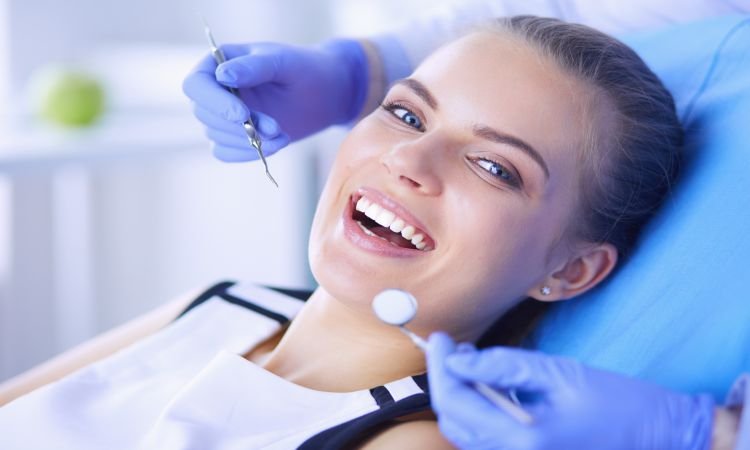 Besides your physical and mental health, one part you must also look out for is your dental health. Good dental health isn’t only about having a clean set of teeth. It also means you’re free from any food stains and cavities when you talk or smile, and your gums won’t bleed easily. To achieve and reap these benefits, you need to practice good oral hygiene habits.
Besides your physical and mental health, one part you must also look out for is your dental health. Good dental health isn’t only about having a clean set of teeth. It also means you’re free from any food stains and cavities when you talk or smile, and your gums won’t bleed easily. To achieve and reap these benefits, you need to practice good oral hygiene habits.
Your oral hygiene habits shouldn’t only consist of brushing your teeth daily. There are still plenty of practices you can do to ensure your gums and teeth stay healthy. Most of these habits have been instilled in you ever since you’re young, and it’s essential to keep practicing them when you reach adulthood. After all, caring for your dental health is a lifetime responsibility.
Here are six habits you need to practice to promote good dental hygiene.
1. Visit Your Dentist
Just like how you visit your doctor annually for general checkups, make sure you do the same for your teeth too. With regular dental checkups, your dentist will be able to detect any potential dental issues and prevent them from getting worse. They’ll also evaluate if you’re at risk of tooth decay and provide you with solutions and habit changes. Best of all, they’ll also provide regular cleanings to keep your teeth and gums free from tartar and plaque buildup.
If you’re around Australia, get yourself a trusted dentist that provides family dental care in Cabramatta. This way, you and your family will have one dentist to go to anytime you need regular checkups or have dental emergencies.
2. Practice Proper Brushing
You have been brushing your teeth ever since you knew how to hold a toothbrush. Brushing is also one of the common ways to boost your dental health. The question now is: are you doing it correctly? Despite brushing your teeth daily, your brushing efforts can go to waste if it’s done incorrectly. Thus, as part of promoting your dental hygiene, make sure you and your family practice proper brushing. Here’s the right way of brushing your teeth.
- Angle your toothbrush at 45 degrees against the gums.
- When moving the brush back and forth, do it in gentle, circular strokes.
- Brush the inner and outer surfaces, including the top areas where stains and food debris are often stuck.
- Don’t forget the tongue by brushing from the back, moving towards the front.
Aside from proper brushing, make sure you brush your teeth twice a day or after every meal. Lastly, remember to change your toothbrush every three months since toothbrushes with damaged and worn-out bristles might not do the job well.
3. Floss Daily
Even if you’re brushing religiously every day, there’s a great chance that a few food particles and other debris are still stuck between your gums and teeth. So, aside from brushing your teeth, flossing every day should also be part of your oral hygiene routine. Unfortunately, some people tend to skip flossing because flossing can cause their gums to bleed.
But the thing is, bleeding gums is normal, especially if you’re not used to flossing yet. Sooner or later, once your teeth and gums are used to it, the bleeding will eventually fade away. Through flossing, you can remove the stuck particles which your toothbrush cannot reach itself. Furthermore, flossing also helps prevent gingivitis and other gum-related diseases. Generally, the best time to floss is at night before going to sleep.
4. Consider Using Mouthwash
Besides brushing and flossing, using an antimicrobial mouthwash can also promote good oral hygiene. However, keep in mind that using mouthwash alone will never be an alternative for brushing or flossing. Instead, it’s an extra step you can do to reduce your risk for gum diseases, tooth decay, and plaque buildup. You can bring a mouthwash to work and rinse your mouth with it during lunch breaks or break times. Let the liquid swish around your mouth for 30 seconds before spitting it out.
 5. Wait Before You Brush
5. Wait Before You Brush
While brushing your teeth is good, doing it immediately after every meal could soften and weaken your enamel and cause irritation. This happens since after you eat or drink something, these products leave some sugar and acid on your teeth. When you immediately brush them off, you’re only spreading them even more around your mouth, resulting in teeth deterioration. So, make sure to wait at least 30 minutes before brushing your teeth.
6. Eat And Drink Mindfully
All the food you put into and go through your mouth can directly affect your oral health. Thus, you must eat mindfully and watch out if those foods positively or negatively affect your teeth. For instance, eating too many sugary foods can put your teeth at risk for tooth decay and plaque buildup. Meanwhile, drinking caffeinated beverages all the time can stain your teeth.
As much as possible, focus on eating fruits and vegetables that can help strengthen your teeth and gums and promote saliva production. On the other hand, opt to drink more water instead of sugary drinks (e.g., fruit juices, soda, coffee) that could stain your teeth and cause dental problems in the future.
Conclusion
Following these six oral hygiene habits will keep your teeth, gums, and mouth healthy for many years to come. If you see any potential dental problems, don’t hesitate to schedule an appointment with your dentist right away.




